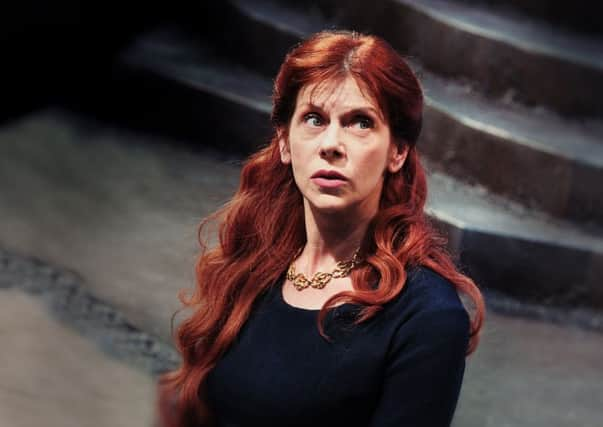Joyce McMillan: Truth behind great theatre unclear


The performance marks the beginning of a US tour that will also take the show to Washington, Chicago and Los Angeles, following visits last year to Moscow and Beijing; and it reinforces Dunsinane’s status as one of the most successful of all National Theatre of Scotland productions, originally co-produced by the Royal Shakespeare Company, and featuring a stunning central performance from Siobhan Redmond as Gruoch, widow and queen of Scotland’s late king, Macbeth.
It’s obvious even from that brief description, though, that Greig’s Dunsinane stands at an oblique angle to the version of Scottish history portrayed in the play that inspired it, Shakespeare’s Macbeth. Partly inspired by Greig’s thoughts on Britain’s recent military involvement in Afghanistan and Iraq, the play not only allows Gruoch to survive her husband, and remain in her castle at Dunsinane after its occupation by English forces, but also plunges into the complex psychology of the conquerors, who arrive from the south determined to restore peace to Scotland and to install their own chosen Scot – Malcolm – as king; but who find that subduing a nation with a mixture of armed force and good intentions is a bitterly complex business.
Advertisement
Hide AdAnd of course, through the character of Gruoch, the play throws some doubt on the received Shakespearean view of Macbeth himself, cast by the bard as an archetypal tyrant and villain in the grip of evil forces. There has long been a quiet murmur of rebellious criticism in Scotland against Shakespeare’s misrepresentation of a king who – according to Scottish chronicles – reigned for 17 years without reports of tyranny, and was viewed as “tall, golden-haired and generous”; the whole play can be read as a “dodgy dossier”, an apology for invasion and colonisation on the pretext of bringing civilisation to a barbarous place.
And these days, it’s not only the Scots who are beginning to question the Shakespearean view of their history, generally shaped – like the chronicles he used as sources – to flatter the bard’s royal patrons, who were Tudors and Stewarts. In the last week, I’ve twice heard English historians angrily disputing the assumptions about the Wars Of The Roses, and in particular about the character of Richard III, perpetuated by Shakespeare’s English history plays; it’s almost as if the recent unearthing of Richard’s bones, under a Leicester car park, marked a more general stirring of consciousness, as people across these islands begin to reassess the received national narrative with which we have lived for the last three or four centuries.
The question for theatre, though, is how this possible shift in awareness – the placing of Shakespeare as a bit of a regime spin-doctor, rather than a faithful servant of truth – affects our perception of the plays, and our approach to staging them. Of course, nothing that we learn about history can diminish the extraordinary, elemental force of Shakespeare’s poetry, either in the great nightmare vision of tyranny he conjures up in Macbeth (first performed for James VI and I in 1604), or in Richard III, a brilliant prototype study of royal villainy written almost a decade earlier.
It should, though, perhaps make us wary of assuming that these plays offer some kind of poetic truth about the history of these islands, when in fact the truth they embody is several degrees more metaphorical, and less literal, than that. To call Macbeth a great play is to state the obvious, in other words. But to call it a Scottish play, or even “the” Scottish play, is to stretch a point beyond what now seems comfortable, inspite of the fact that without what Shakespeare had read of Scotland – its rocks and moors, its dark nights, its names and clans – his mighty poetry might never have soared as it did, into a place far beyond history or geography, and into a nightmare of tyranny and injustice that belongs everywhere, or nowhere at all.